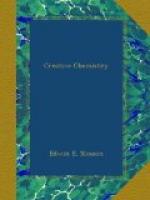A true perfume consists of a large number of odoriferous chemical compounds mixed in such proportions as to produce a single harmonious effect upon the sense of smell in a fine brand of perfume may be compounded a dozen or twenty different ingredients and these, if they are natural essences, are complex mixtures of a dozen or so distinct substances. Perfumery is one of the fine arts. The perfumer, like the orchestra leader, must know how to combine and cooerdinate his instruments to produce a desired sensation. A Wagnerian opera requires 103 musicians. A Strauss opera requires 112. Now if the concert manager wants to economize he will insist upon cutting down on the most expensive musicians and dropping out some of the others, say, the supernumerary violinists and the man who blows a single blast or tinkles a triangle once in the course of the evening. Only the trained ear will detect the difference and the manager can make more money.
Suppose our mercenary impresario were unable to get into the concert hall of his famous rival. He would then listen outside the window and analyze the sound in this fashion: “Fifty per cent. of the sound is made by the tuba, 20 per cent. by the bass drum, 15 per cent. by the ’cello and 10 per cent. by the clarinet. There are some other instruments, but they are not loud and I guess if we can leave them out nobody will know the difference.” So he makes up his orchestra out of these four alone and many people do not know the difference.
The cheap perfumer goes about it in the same way. He analyzes, for instance, the otto or oil of roses which cost during the war $400 a pound—if you could get it at any price—and he finds that the chief ingredient is geraniol, costing only $5, and next is citronelol, costing $20; then comes nerol and others. So he makes up a cheap brand of perfumery out of three or four such compounds. But the genuine oil of roses, like other natural essences, contains a dozen or more constituents and to leave many of them out is like reducing an orchestra to a few loud-sounding instruments or a painting to a three-color print. A few years ago an attempt was made to make music electrically by producing separately each kind of sound vibration contained in the instruments imitated. Theoretically that seems easy, but practically the tone was not satisfactory because the tones and overtones of a full orchestra or even of a single violin are too numerous and complex to be reproduced individually. So the synthetic perfumes have not driven out the natural perfumes, but, on the contrary, have aided and stimulated the growth of flowers for essences. The otto or attar of roses, favorite of the Persian monarchs and romances, has in recent years come chiefly from Bulgaria. But wars are not made with rosewater and the Bulgars for the last five years have been engaged in other business than cultivating their own gardens. The alembic or still was invented by the Arabian alchemists for the




